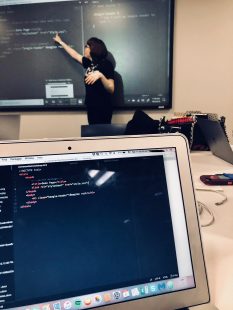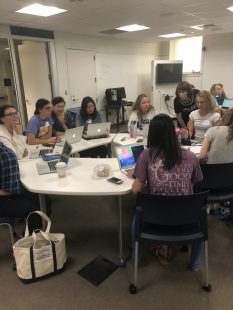We now have a new minor in Digital Culture and Information. This minor is an outcome of W&L’s digital humanities initiatives over the last six years.
We’re not abandoning the term DH. W&L will still continue to have a strong set of programmatic DH initiatives. We chose the term Digital Culture and Information (DCI) to recognize that our curricular efforts in DH extend beyond the humanities and into the social sciences, pre-professional fields (such as accounting, business administration, journalism, and strategic communication), and STEM disciplines. (And, yes, over the years we had huge debates over naming the minor.)
From our proposal for creating the minor:
An interdisciplinary program in Digital Culture and Information (DCI) allows students to deeply explore how the digital age impacts knowledge and society. Students will discover how software transforms information into valuable resources as well as the dangerous potential of algorithmically biased tools. Through courses that integrate theory with hands- on practice, students will develop creative projects that demonstrate their emerging expertise in digital media. The program is designed to teach students concepts and methods that will enhance their academic success within any major. Students participating in the program will gain significant experience with technological platforms, complex information resources, and visual design. The course of study nurtures critical reflection on the underlying structure of information and not merely technical proficiency. A minor in Digital Culture and Information provides the foundation for a career in any field and for life as an informed citizen in a digital society.
For those who are interested, here’s the full 23-page proposal for creating a minor in Digital Culture and Information (pdf).
Course of Study Requirements
Update: View the W&L site for the updated course of study.
A minor in digital culture and information requires completion of 18 credits, as follows. In meeting the requirements of this interdisciplinary minor, a student may not use more than nine credits (including capstone) that are also used to meet the requirements of other majors or minors. [The nine credits limitation is a W&L policy.]
Required courses:
DCI 102: Data in the Humanities (offered every Fall) 3 credits
DCI 108: Communication through the Web (offered every Fall) 3 credits
At least six credits chosen from the following:
DCI 110: Web Programming for Non-Programmers (offered every Winter) 4 credits
DCI 175: Innovations in Publishing (offered alternating Spring Terms) 4 credits
DCI 190: DH Studio [offered as needed] 1 credit
DCI 393: Creating Digital Scholarship (offered every Winter) 3 credits
DCI 403: Directed Individual Study (as needed) 3 credits
History 211: 19th-Century Scandal, Crime, Spectacle. 3 credits
Journalism 341: Multimedia Storytelling Design (offered every Winter) 3 credits
At least three credits chosen from the following:
Business 306: Seminar in Management Information Systems
Business 310: Management Information Systems
Business 315: Database Management for Business
Business 317: Data Mining for Sales, Marketing and Customer Relationship Management
Business 321: Multimedia Design and Development
Classics 343: Classics in the Digital Age
Computer Science (any course)
DCI 180 First-Year Seminars (offered every Fall and alternating Winter)
English 453: Internship in Literary Editing with Shenandoah
German 347: Goethe–Sentimentality to Sturm and Drang
German 349: Digital Goethe
Sociology 265: Exploring Social Networks
Sociology 266: Neighborhoods, Culture and Poverty
and, when approved in advance, DCI-designated courses offered in other disciplines.
Capstone project:
Three credits chosen from DCI 393, 403 (not used above), or a capstone or honors thesis in the major field of study, of sustained intellectual engagement using digital tools or methods and approved one term in advance of beginning by the core faculty of the minor
Portfolio:
At least three projects or assignments, in addition to the capstone, from courses in the minor which demonstrate attention to design, user experience, awareness of audience, and professional or academic context, and including both reflection on and analysis of each work in the portfolio.
Organizational issues
One of the distinguishing characteristics of the DCI minor is that it is based in the library though we still view it as an interdisciplinary minor with broad participation of faculty from other departments. Librarians at W&L have faculty status and the University Library is organized as an academic department within the College. The library faculty are teaching the required courses in DCI, coordinating the capstone and portfolio experiences, as well as teaching many of the DCI electives.
The official approval of this minor is a significant milestone for DH at W&L. It truly has been a collaborative effort over the years involving a lot of conversations, often with challenging viewpoints in those discussions. Collaboration is a process, and dissent is a critical element towards improving any initiative. Over time we talked it through, and we’re all better for that.
Thanks!
A huge thanks to Dean Suzanne Keen, who championed the digital humanities and provided the vision for DH in the undergraduate curriculum. We will miss her dearly and wish her the best in her new role at Hamilton.
Tremendous gratitude goes to Paul Youngman (Professor and Chair of German, Russian, and Arabic) for his brilliant leadership of the DH Committee.
Sara Sprenkle (Computer Science) for her enthusiastic support of a minor all along, for co-teaching with Paul the very first DH course at W&L in 2014, and all her efforts in DH here.
The library faculty have been remarkable in pulling together to create a curriculum. Jason Mickel (Director of Library Technology) came up with the term digital culture and information, and he eagerly embraces teaching at every possible opportunity. Mackenzie Brooks (DH librarian) shouldered the burden of co-teaching two DH courses with me, and she has demonstrated a remarkable aptitude in working with undergrads and developing her own courses. And thanks to all the librarians at W&L who are contributing to the new minor. The DCI minor is now a significant aspect of library instruction and belongs to all of us. The University Librarian John Tombarge deserves particular thanks for allowing us to even pursue this type of curricular initiative.
A special appreciation goes out to the two people who have served as Mellon DH Fellows at W&L. Brandon Walsh provided essential input into the structure of the minor. Sydney Bufkin thought deeply about the capstone experience and devoted significant effort this past year to co-drafting the proposal.
Thanks to our faculty colleagues who have contributed to DH at W&L and especially to those who provided feedback on the proposal, particularly Sarah Horowitz (History), Toni Locy (Journalism), Steve McCormick (French), and Jon Eastwood (Sociology). We’re excited for future collaborations with faculty across campus as we make the DCI minor into a suitable complement for any academic major.
Of course, we do this for our students. It’s about them. We’re fortunate to have the opportunity to learn from these students. They make us better teachers.

 After a break for lunch of delicious chili and corn muffins, Professor Bufkin led the Cohort in exploring what having our own web domains entails and the options before us. She showed us how to use a CMS (Content Management System), which renders the desired content on the webpage, displaying it on a browser. Using a CMS, specifically WordPress, was extremely useful for our purposes because it was a simple way to get content on the web and the page up and running while working on HTML and CSS locally. WordPress allows web designers to use HTML in the text editor for posts or pages and customize additional CSS, allowing us to continue to experiment with HTML and CSS while we take advantage of the structure it provides for our websites without having to create our website from scratch. As we experimented with our websites, we considered important questions for web design, including what kind of pages do I need? How will users navigate my website? What kind of content will be on my webpage? Mostly photos or will I want writing? If I include a lot of writing, how should I use the white space on the page? What fonts should I use? The decisions and possibilities behind designing and customizing a webpage seemed endless.
After a break for lunch of delicious chili and corn muffins, Professor Bufkin led the Cohort in exploring what having our own web domains entails and the options before us. She showed us how to use a CMS (Content Management System), which renders the desired content on the webpage, displaying it on a browser. Using a CMS, specifically WordPress, was extremely useful for our purposes because it was a simple way to get content on the web and the page up and running while working on HTML and CSS locally. WordPress allows web designers to use HTML in the text editor for posts or pages and customize additional CSS, allowing us to continue to experiment with HTML and CSS while we take advantage of the structure it provides for our websites without having to create our website from scratch. As we experimented with our websites, we considered important questions for web design, including what kind of pages do I need? How will users navigate my website? What kind of content will be on my webpage? Mostly photos or will I want writing? If I include a lot of writing, how should I use the white space on the page? What fonts should I use? The decisions and possibilities behind designing and customizing a webpage seemed endless.